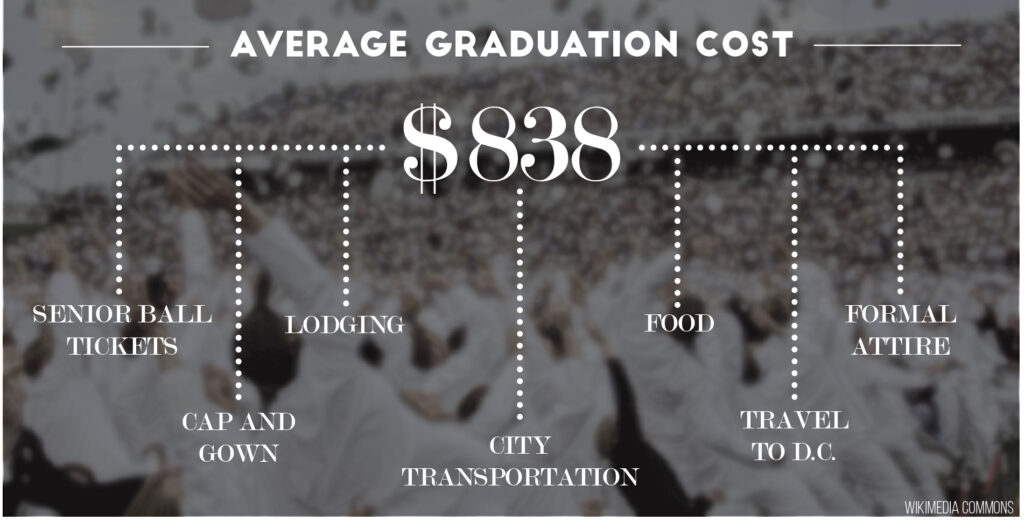Celebrations can be expensive. Americans spend an average of $830 at Christmas, and the average American wedding costs a whopping $32,641. While not all Hoyas celebrate Christmas, and marriage is not on the radar of many students here, there is one potentially expensive event we all will hopefully celebrate in the near future: graduation.
In addition to seemingly obvious costs like travel and lodging, there are often hidden costs associated with graduation. Many graduates are surprised at how much they spend on other associated costs, like clothes for themselves and their families, and meals at restaurants in the city.
According to a survey sent out by the Georgetown Scholarship Program (GSP) to recently-graduated members of its program in the class of 2015, the average student in GSP spent $838 at graduation. When allowed to select two items from a list of possible stressors during graduation or to describe their own, 72 percent of respondents said that graduation costs were a stressor.
Financial burdens, though, were not the only concern. 36 percent of respondents had other concerns related to graduation events, such as what they or their families would wear. For example, Senior Ball was a black-tie-optional event in the past; however, starting with the class of 2016 there was no dress code.
The survey also allowed students to write reflections anonymously, which touched on both financial and emotional burdens some low-income students face at graduation.
“Now that I think about it, there were certain things that I took as a given because my family didn’t have the funds to handle it—like going out to dinner or lunch to celebrate the day or not being able to take my siblings to Senior Ball when a lot of my other peers did,” one student wrote. “My family and I got creative and handled it but hearing from my family members about their overwhelming experience and culture shock wasn’t helpful either.”
Another student wrote, “One of the reasons my family did not want to go to Senior Ball was because they did not feel comfortable enough to go.”
Echoing a similar sentiment, a third student wrote, “I attended the ball with my family, and they were so overwhelmed that we left early.”


At Harvard, around 60 percent of students come from the wealthiest three percent of American families. GSP director Missy Foy (COL ’03) said the numbers are roughly the same for Georgetown, basing the calculation on Harvard’s research. On a university campus where the majority of students are from an affluent background and where the cost of attendance just reached a high of $70,140, some low-income graduating students have to make sacrifices that students from wealthier backgrounds do not experience.
“I remember coming by a list of, you know, how much it costs for a student to take a family out to dinner or something after graduation, which seems like a very easy thing to think about, but when it’s someone who’s coming from such a low income, it becomes a barrier, it becomes an issue,” said Francisco González (SFS ’16) who was also on the GSP Student Board for two years. “They have issues like, ‘Do I bring Grandma to my graduation, or do I not bring Grandma?’, ‘Do I bring one of my parents, or do I bring both of them?’”
The challenges low-income students face near graduation are not unique to Georgetown. According to a 2015 article in Harvard Magazine, the Harvard financial aid office provides some assistance to students with a significant financial need to help offset the estimated $2,000 cost of graduating; however, these programs are not always well-known.
Additionally, by the time some graduating seniors experience these challenges, they have already graduated and left campus, which may make on-campus dialogue around the issue challenging.
Despite the high costs that graduates today face, the celebrations were not always as burdensome to lower-income students.
Maria Devaney (School of Languages and Linguistics ’94), a member of both the GSP Executive Board and the University’s Board of Governors, described some of the changes to the celebrations that have taken place over the past several decades.
“My class was the first to do two things … and not in a good way,” Devaney said. Her class increased the scale of both Senior Ball and the Senior Auction. According to Devaney, in the decades before her time, Senior Ball was known as Barefoot Ball and took place in front of White Gravenor. Several years before her graduation, Senior Ball moved to a hotel, until her graduation when it was held at Union Station for the first time.
For Senior Auction, the event moved from the Hall of Nations in the Walsh Building to a hotel and also increased in ticket price and item price, Devaney said. “In the past five or ten years it’s all really snowballed, and become that much more scaled up and maybe a little over-scaled.”
Devaney thinks reinstating the Barefoot Ball would be one way to alleviate stressors low-income students face at graduation. “There could be a lot of fun options. Going back to Barefoot Ball on the steps of White Gravenor could be so fun, and it would really bring it back home to Georgetown.”
GSP and the greater Georgetown community are working toward solutions to alleviate some of the problems low-income students face at graduation. According to Foy, GSP provides a $200 grant to each of its graduating seniors in a program funded by an anonymous donation for graduation expenses.
In addition to the grant, within GSP, the Strategic Partnership and Advocacy Committee (SP&A), recently rebranded as the Outreach and Strategic Partnership Committee, is spearheading initiatives for graduating students. The SP&A started a partnership with Residential Living to provide discounted housing for the families of graduating families. They have also targeted financial concerns surrounding Senior Ball by partnering with the Senior Class Committee to remove the dress code and sponsor discounted tickets to the event for graduating students and their families.
Continuing to build off the progress they have made, the SP&A hopes to develop further programs to alleviate costs for low-income students and their families at graduation. The committee has grown significantly in the past year in order to accomplish this.
“They have a much larger SP&A section where, for the previous years, there were just two of us … there are so many issues to tackle and they really wanted to be able to focus on graduation issues as well as other issues,” said Quaila Hugh (COL ’16), an SP&A chair for the 2015-16 school year.
According to Tithi Patel, a chair of GSP’s Outreach and Strategic Partnership, there are several initiatives they hope to develop over the course of the year.
Some of these plans include discussions with Residential Living to move discounted housing for the families of graduating students from New South to Village C West; possible partnerships with area business for discounts for graduating seniors and their families; and talks of creating a cap-and-gown closet.
“Buying robes and caps … will cost money, and for a ceremony that is going to last maybe an hour and half to two hours, some people don’t really see merit in buying or spending money on extra stuff like that so it will be really cool if we could get alumni to donate some of their robes,” said Patel.
Many people are optimistic because of the University’s continued response concerning the issues low-income students face at graduation and with the increasing awareness on campus regarding these issues.
Devaney thinks that the University has made progress with regards to increased awareness, but she believes that there is still further progress to be made. “The next step following the conversations should be to put solutions in place that strengthen our university community, and I think to have other options for graduating students and their families in addition to Senior Ball would be an excellent start.”
Patel thinks that there is more on-campus dialogue surrounding these issues now, but that there is room for improvement. “We’re really pushing … to get more people, whether they are part of the low-income community or not, to really start thinking about the different issues that affect low-income students on campus, whether that’s the first day of school or the last when they’re graduating.”





